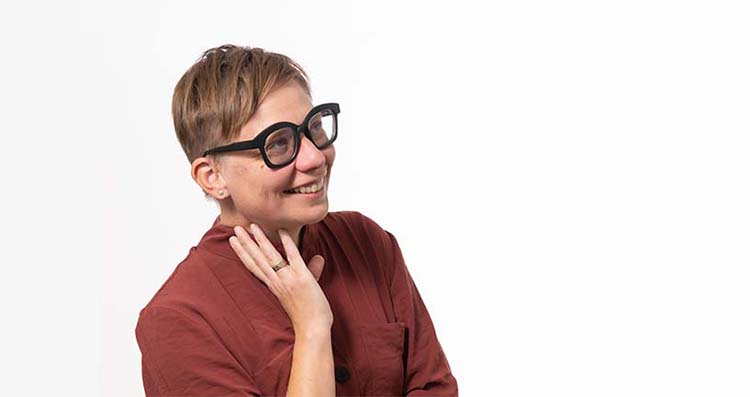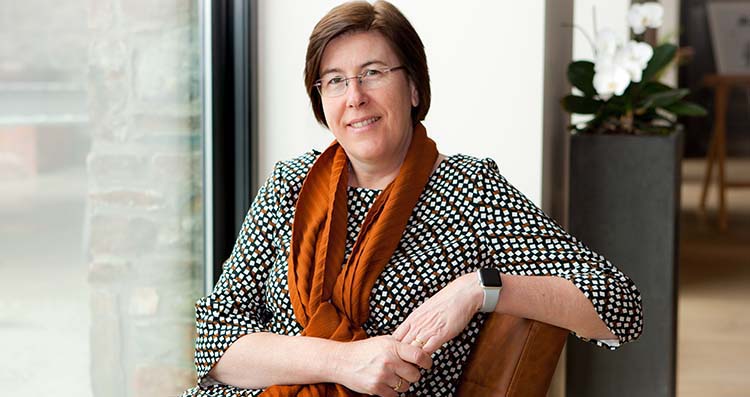An growing number of women in safety and prevention: Five questions to our Mensura panel
Safety and prevention has been a men's world through and through for decades. Even so, feminisation has been ongoing for a while now. At Mensura too, the number of female prevention advisers and occupational physicians is on the rise. This Women's Day, we put five questions to a panel of five women about their role, 'female' skills, and the importance of this day.
The panel
"Inequality and discrimination are far from being a thing of the past."
Anne Berghmans, prevention adviser
"Every day is both a woman's day and a man's day"
Gretel Schrijvers, Managing Director
"The added value comes from having a healthy balance, that's pure science"
Muriel Van Cauwenberghe, prevention adviser
"Men and women approach things from a different perspective. Those differences are something we should embrace, as they complement one another."
An De Roeck, Medical Director
“Our job still often takes place in a man's world.”
Heidi Henkens, prevention adviser for psychosocial aspects
1. What does Women's Day mean to you?
Anne Berghmans: “This day reminds us of the importance of women in society, in private as well as professional life. Because although a lot of progress has already been made in terms of emancipation, inequality and discrimination are far from being a thing of the past."
Gretel Schrijvers: "I think it's a shame that we still need a Women's Day to draw attention to the position of women in society. Every day should be both a woman's day and a man's day."
Muriel Van Cauwenberghe: "That's right, for me there is no need for such awareness days. We have to show respect for each other every day, don't we? By putting women in the spotlight for one day, we might even feed the gender stereotypes we want to get rid of."
An De Roeck: "To me, Women's Day is like every other day. I don't feel like I'm valued any more or any less than a man. But for women who are still facing gender inequality every day, I believe the statement made by International Women's Day genuinely matters."
Heidi Henkens: "By the way, we also have to get rid of the binary gender concept. Each identity within the broad gender spectrum must be given the same opportunities, without sweeping the differences under the carpet. Not gender equality, but gender equivalence."

Heidi: “Our job still often takes place in a man's world.”
2. In your job, are you sometimes treated differently to your male colleagues?
Heidi Henkens: "Our job as a prevention adviser still often takes place in a man's world. Apart from the more caring aspect, we also have an advisory and steering role. For example, we sometimes have to address a business manager about abuse in his workplace, or an employee about inappropriate conduct. You might sometimes treated in a condescending manner in such situations. Although that has more to do with unequal power relations than with gender in itself."
An De Roeck: "Personally, I don't notice any clear difference between myself and my male colleagues. Everyone is treated equally. Even so, that certainly hasn't always been the case: while studying to be a surgeon, I had to work twice as hard as a woman to succeed. Then again, that was exactly what motivated me to prove to everyone that I was just as capable."
A rise in the number of female prevention advisers
"In 2021, we had 54% female trainees on our Level 3 Prevention Adviser training. The year before, that figure was as high as 60%," says Julie Pottier, training business line manager at Mensura. Figures from the knowledge centre Prebes confirm the feminisation trend among safety and well-being experts. The less time they have spent in the profession, the more often the prevention adviser is a woman.
"In the past, the prevention adviser's duties focused entirely on safety, and it was typically a job for older, male employees," explains Julie Pottier. "The mandatory training and refresher courses for prevention advisers and environmental coordinators have changed this. They are clearly attracting a younger audience and more women."
3. Has full gender equality already been achieved in your professional context today?
An De Roeck: "We've come a long way, but there is still room for improvement in some sectors. Regardless of what you do or where you work: women should earn the same as men in the same role. On top of that, the sex of an employee must never have an impact on their options for growth within a company. Unfortunately, that is still the case in some sectors."
Heidi Henkens: "I also notice that 'female' qualities such as caring, understanding or social sensitivity are still sometimes labelled as negative in the workplace. Yet it is important to show your emotions or vulnerability in the work context as well. It would even help to prevent burn-outs."
Muriel Van Cauwenberghe: "Legislation should also further loosen up the classic gender roles. By allowing fathers to stay home for their children more often or for longer, for example. The same benefits for everyone — that’s just common sense, right?"

An: "Men and women approach things from a different perspective. Those differences are something we should embrace, as they complement one another."
4. Mensura has a relatively high number of women at board level. How do you feel about that?
Gretel Schrijvers: "Within Mensura, we select purely on competencies; sex, age, sexual orientation or personal beliefs never play any role. The result is a healthy balance of employees."
An De Roeck: "And that's a good thing, as it is important to have a good balance between both sexes. Men and women approach things from a different perspective. Those differences are something we should embrace, as they complement one another."
Muriel Van Cauwenberghe: "The added value comes from having a mix, that's pure science. But I make no secret of the fact that I am happy to work in an organisation in which ambitious women have equal opportunities."

Gretel: "Every day is both a woman's day and a man's day"
5. Would you recommend your job to other women?
Heidi Henkens: "Absolutely, but to men as well! There are currently more female prevention advisers for psychosocial aspects with us than male ones. A little more diversity within my own team would be an added value for me."
Anne Berghmans: “The job of prevention adviser is full of variety and requires knowledge, conscientiousness, listening skills, adaptability and so on. And last but not least: you have to be prepared to swap your heels for safety boots every now and then and your warm office for a chilly construction site!"